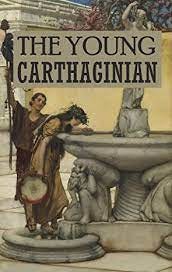If you are looking for the beginning of the study for The Young Carthaginian then you can go HERE for a brief introduction. At the bottom of the introduction you will find the links to each section of the study guide as it becomes available. If you would like to see the growing list of book studies available for free on this site you can go HERE. Enjoy!
Grammar Questions: (The Information of the Text)
What was “the creed of the Barcine party”?
What had Hanno’s party “forgot”?
What are the four steps to Hannibal’s plan?
What was an attack on Rome’s allies “equivalent” to?
What new role did Malchus take on in Hannibal’s army?
What reasons did Malchus give for choosing Trebon as his lieutenant?
Describe the circumstances by which Malchus stumbled on to the plot against Hannibal.
How did Malchus foil the plot against Hannibal?
What is the response of the two Carthaginian noblemen after having their lives spared by Hannibal?
How did stopping this plot against Hannibal help Malchus?
Logic Questions: (Interpreting, Comparing/Contrasting, Reasoning)
Why did Malchus not immediately “rejoin his comrades” after learning about Hannibal’s battle plans against the might of Rome?
Why did Hannibal choose to let the two Carthaginian conspirators live?
Why did Hannibal only put to death “the natives” directly involved in the plot and refuse to allow his army to slaughter any more?
Rhetoric Questions: (The Analysis of Ideas in the Text)
Nepotism means using one’s power to show special favor to relatives or friends, especially in granting positions of power of influence. How do we see nepotism in this story? Is nepotism wrong? Why or why not?
Malchus imagines a future in which Hannibal and his troops return from victory against Rome and where “the shouting multitudes…would acclaim the soul arbitrator of the destinies of Carthage”. Why do you think people tend to attach so much importance to one man when clearly the actions of so many, and circumstances outside of man’s control, are all factors? Is it appropriate to ascribe to men such greatness? Why or why not?
Do you think Hannibal acted justly and wisely in sparing the two Carthaginian nobles? Can an action be one and not the other? Explain your answer carefully.
Theological Analysis: (Sola Scriptura)
Proverbs 16:32 states, “Whoever is slow to anger is better than the mighty, and he who rules his spirit than he who takes a city.” How might we relate this verse to Hannibal in the current chapter?



